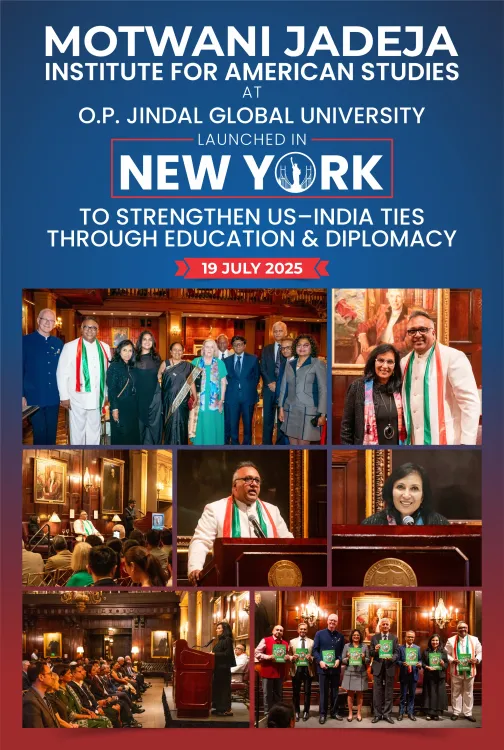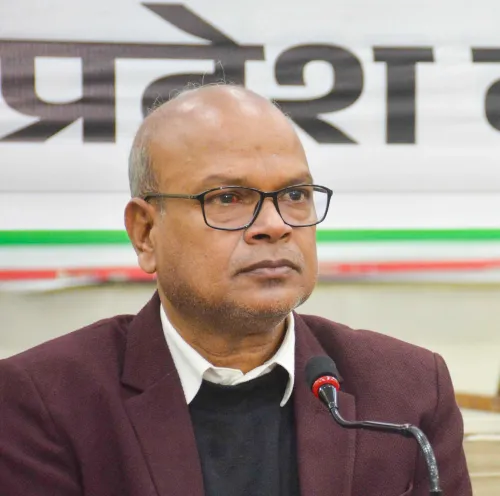How is the Motwani Jadeja Institute for American Studies Strengthening Indo-US Ties?

Synopsis
Key Takeaways
- New Academic Centre: MJIAS aims to enhance research and policy exchange.
- Global Leadership: Focus on empowering future leaders through collaboration.
- Innovative Initiatives: Launching various programs to foster academic exchange.
- Support for Sustainability: Contributing to UN SDGs through educational efforts.
- Diplomatic Engagement: Strengthening ties between India and the US through education.
New York, July 22 (NationPress) In a significant move to enhance India-US educational collaboration and global leadership, O.P. Jindal Global University (JGU) officially launched the Motwani Jadeja Institute for American Studies (MJIAS) during a prestigious ceremony in New York.
The event was highlighted by the concurrent launch of the JGU Sustainable Development Report 2025 and a Distinguished Public Lecture featuring notable Indian and international personalities, reflecting the university's comprehensive approach to education, diplomacy, and innovation.
The Motwani Jadeja Institute for American Studies (MJIAS) aims to be a groundbreaking centre dedicated to research, public policy, education, innovation, and cultural exchange between India and the United States.
This institute is established through the generous support of the Motwani Jadeja Foundation, led by Asha Jadeja Motwani, an influential philanthropist and venture capitalist from Silicon Valley.
A Visionary Academic Collaboration Between India and the US
The institute is named in tribute to Professor Rajeev Motwani, a distinguished computer scientist whose mentorship of innovators, including Google's founders, has significantly impacted the global technology and innovation sector.
In his welcoming remarks, Professor (Dr) C. Raj Kumar, Founding Vice Chancellor of JGU, hailed the institute as “a robust symbol of academic diplomacy that not only commemorates a legacy of scientific excellence but also forges intellectual connections between nations.”
He elaborated: "The Motwani Jadeja Institute for American Studies (MJIAS) is more than just the launching of a new academic entity -- it is a profound affirmation of our conviction that universities should act as catalysts for global transformation. In an age beset by unprecedented challenges, we need platforms like MJIAS that foster critical thought, uphold democratic values, and prepare our students to be both professionals and public intellectuals. This institute honors the pioneering brilliance of Professor Rajeev Motwani and the remarkable generosity and vision of Asha Jadeja. It will serve as a bridge connecting India and the United States, technology and humanities, policy and innovation, and above all, ideas and action.”
Empowering the Future: Asha Jadeja’s Global Vision
In her foundational address, Asha Jadeja Motwani shared her commitment to cultivating ecosystems that empower changemakers, especially in the Global South. She stated: “We are at a pivotal moment in human history. The technological revolution we are experiencing requires new leadership paradigms -- leadership that is ethical, empathetic, interdisciplinary, and globally aware. Through MJIAS, we are not just honoring Rajeev’s spirit of democratizing innovation and knowledge; we are also realizing an ambitious vision -- to create a space where the next generation of leaders from India and the USA can question, collaborate, and innovate together. We are establishing a platform that promotes dialogue, disrupts antiquated systems, and encourages a mindset of fearless experimentation. My deepest aspiration is for this Institute to become a beacon for South–North partnerships and a hub for intellectual and entrepreneurial dynamism from India, the United States, and beyond.”
She also unveiled future initiatives under MJIAS, including India-US student fellowships, collaborations for start-up accelerators, and visiting professorships to bring esteemed American scholars to India, and vice versa.
Institutional Leadership and Academic Diplomacy Professor (Dr) Mohan Kumar, former Ambassador of India to France and Founding Director-General of MJIAS, presented the Institute's Vision Statement. He emphasized the strategic and intellectual importance of strengthening Indo-US ties through knowledge exchange.
“MJIAS will engage with geopolitics, digital governance, trade, technology, and defense -- all aimed at cultivating a robust strategic partnership while 'ring-fencing' it from geopolitical uncertainties,” he commented.
Prominent scholars from top US universities, Professor (Dr) Jayanth Krishnan (Chair, International Board of Advisors, JGU), Indiana University Maurer School of Law, and Professor Sital Kalantry (Vice Chair), Seattle University School of Law, underscored the significance of interdisciplinary education, legal and technological innovation, and academic integrity. They commended MJIAS for positioning itself at the intersection of liberal values, democratic principles, and global citizenship.
Consular Recognition: India’s Diplomacy and Academic Soft Power
In a compelling Presidential Address, H.E. Binaya Srikanta Pradhan, Consul General of India in New York, lauded the Institute as “a timely and significant contribution to the India-US strategic partnership,” noting that academic institutions like MJIAS embody the essence of “knowledge diplomacy.”
He added, “Our nations share a foundation of democracy and diversity. This Institute will strengthen that partnership through research, policy dialogue, and connections between people.”
Launch of the JGU Sustainable Development Report 2025
The evening also marked the formal unveiling of JGU's Sustainable Development Report 2025, authored by Professor Padmanabha Ramanujam, Dean of Academic Governance. The report provides a comprehensive overview of the university’s contributions to all 17 UN Sustainable Development Goals (SDGs) via teaching, research, community engagement, infrastructure, and institutional strategy.
Justice Michael Wilson, Former Judge of the Supreme Court of Hawaii and a Distinguished Professor at JGU, reflected on the report, stating: “What JGU has accomplished is to create an institutional template for sustainability -- a model that can be emulated by universities worldwide. This is the role of academia -- to lead by example.”
Distinguished Public Lecture: A Confluence of Law, Technology, and Governance
The final part of the evening featured a Distinguished Public Lecture by two of India’s most respected public figures -- Hon’ble Justice U.U. Lalit, Former Chief Justice of India, who discussed the significance of education in fortifying constitutional democracy.
In his lecture, he asserted: “The role of a university in any society is not only to impart knowledge but also to cultivate conscience. Today, we face complex questions regarding the rule of law, justice, and constitutional morality -- not just in India but globally. In this context, institutions like the Motwani Jadeja Institute become critically important. They stand at the forefront of democratic resilience, equipping young minds with not only reasoning and argumentative skills but also the moral compass necessary for leadership and service. Having spent decades in the judiciary, I greatly appreciate academia's ability to challenge authority, scrutinize power, and uphold constitutional principles.”
Dr Palanivel Thiaga Rajan, Minister for Information Technology and Digital Services, Government of Tamil Nadu, delivered a keynote address on the future of data governance, AI ethics, and digital innovation. He advocated for stronger collaborations between universities and governments to create public value through evidence-based policymaking and inclusive technologies.
The lecture was moderated by Professor R. Sudarshan, Dean of the Jindal School of Government & Public Policy, who highlighted the unique convergence of law, policy, technology, and ethics in the discussions of the evening.
Professor (Dr) Akhil Bhardwaj, Vice Dean of International Affairs and Global Initiatives, wrapped up the evening with a Vote of Thanks, declaring it “a historic moment for JGU and a call to action for universities globally to be bolder, braver, and more connected internationally.”










